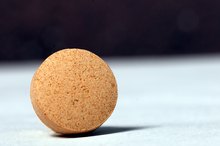Niacin and Impotence
Three types of medications to treat erectile dysfunction -- sildenafil, vardenafil and tadalafil -- may cause low blood pressure. Niacin, used to treat conditions such as high cholesterol and hardening of the arteries, can also lower your blood pressure. If you take medications to treat male impotence, ask your doctor before combining it with niacin.
Blood Pressure
Sildenafil, vardenafil and tadalafil increase the amount of nitric oxide in your body. Your body contains nitric oxide naturally, which is a gas that relaxes blood vessels. Medications to treat erectile dysfunction relax blood vessels in a man’s penis to help obtain and maintain an erection. Some medications that treat high blood pressure, high cholesterol and heart disease also relax your blood vessels. If you take niacin while you also take medications to treat erectile dysfunction, your blood pressure could drop drastically. You could faint or develop other health problems.
- Sildenafil, vardenafil and tadalafil increase the amount of nitric oxide in your body.
- If you take niacin while you also take medications to treat erectile dysfunction, your blood pressure could drop drastically.
Niacin and Cholesterol
Is Niacin Good or Bad for the Liver?
Learn More
Niacin, prescribed for more than 50 years, has been successful in treating all three types of lipids in your bloodstream. It can reduce levels of low-density lipoprotein -- LDL, or “bad,” cholesterol -- and triglycerides, as well as elevate your levels of protective high-density lipoprotein -- HDL, or “good,” cholesterol. But other medications, as well as diet and lifestyle changes, can restore your cholesterol to heart-healthy levels. If you currently take niacin and want to start taking medication to treat erectile dysfunction, ask your doctor about switching to a different type of cholesterol medication.
- Niacin, prescribed for more than 50 years, has been successful in treating all three types of lipids in your bloodstream.
Niacin Side Effects
Niacin -- with or without the addition of drugs to treat impotence -- poses serious health risks, including stomach ulcers and liver damage. If you have Type 2 diabetes, taking niacin could cause drastic elevations in your blood sugar levels. Less serious side effects include stomach upset and skin flushes -- your face and chest turn red and your skin itches, tingles or burns. You can purchase niacin without a prescription, but some over-the-counter formulas -- no-flush varieties that contain niacinamide -- will unlikely help lower your cholesterol 2.
- Niacin -- with or without the addition of drugs to treat impotence -- poses serious health risks, including stomach ulcers and liver damage.
- You can purchase niacin without a prescription, but some over-the-counter formulas -- no-flush varieties that contain niacinamide -- will unlikely help lower your cholesterol 2.
Erectile Dysfunction Medications
Aspavor Side Effects
Learn More
Minor side effects associated with erectile dysfunction medications include indigestion, runny nose and skin flushes. Sildenafil may cause temporary changes in your vision, and vardenafil may cause muscle aches and back pain. More serious side effects include hearing loss and erections that last longer than four hours. If you have cardiovascular problems, including a history of heart attacks or strokes, high or low blood pressure or vision problems such as retinitis pigmentosa, it may prove unsafe for you to take sildenafil, vardenafil or tadalafil. These medications may also interact poorly with some antibiotics, blood thinners and medications to prevent seizures and heart rhythm disorders.
- Minor side effects associated with erectile dysfunction medications include indigestion, runny nose and skin flushes.
- These medications may also interact poorly with some antibiotics, blood thinners and medications to prevent seizures and heart rhythm disorders.
Related Articles
References
- University of Maryland Medical Center: Vitamin B 3 (Niacin)
- MedlinePlus: Niacin and Niacinamide (Vitamin B3)
- National Institutes of Medicine Office of Dietary Supplements. Niacin Fact Sheet for Health Professionals. Updated June 3, 2020.
- MedlinePlus. Niacin. Updated June 4, 2020.
- Boden WE, Probstfield JL, Anderson T, et al. Niacin in Patients with Low HDL Cholesterol Levels Receiving Intensive Statin Therapy. N Engl J Med. 2011;365(24):2255-2267. doi:10.1056/NEJMoa1107579
- Morris MC, Evans DA, Bienias JL, et al. Dietary niacin and the risk of incident Alzheimer's disease and of cognitive decline. J Neurol Neurosurg Psychiatry. 2004;75(8):1093-1099. doi:10.1136/jnnp.2003.025858
- Elam MB, Hunninghake DB, Davis KB, et al. Effect of Niacin on Lipid and Lipoprotein Levels and Glycemic Control in Patients With Diabetes and Peripheral Arterial Disease: The ADMIT Study: A Randomized Trial. JAMA. 2000;284(10):1263-1270. doi:10.1001/jama.284.10.1263
- Zhai G. Alteration of Metabolic Pathways in Osteoarthritis. Metabolites. 2019;9(1):11. doi:10.3390/metabo9010011
Writer Bio
Kathryn Gilhuly is a wellness coach based in San Diego. She helps doctors, nurses and other professionals implement lifestyle changes that focus on a healthy diet and exercise. Gilhuly holds a Master of Science in health, nutrition and exercise from North Dakota State University.









